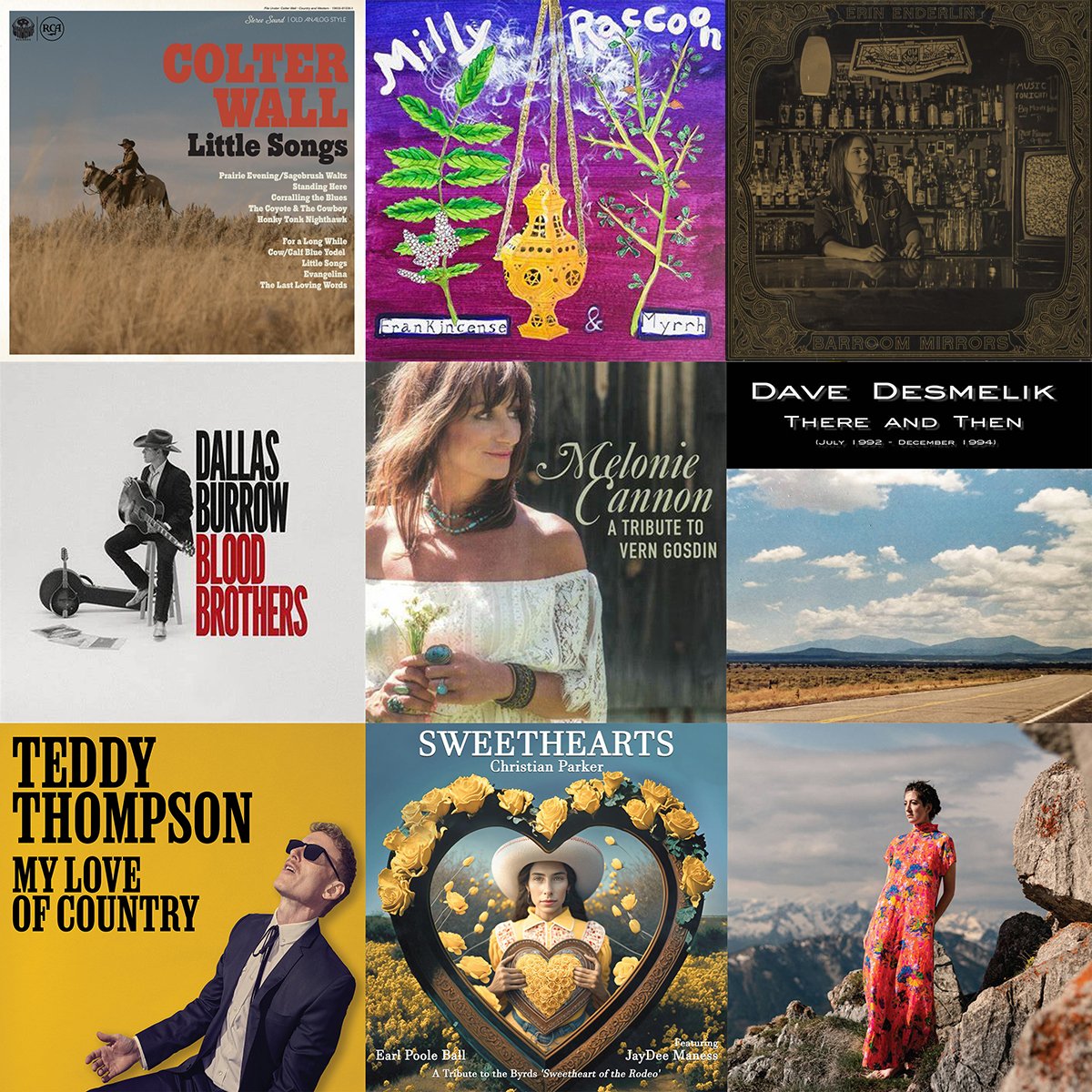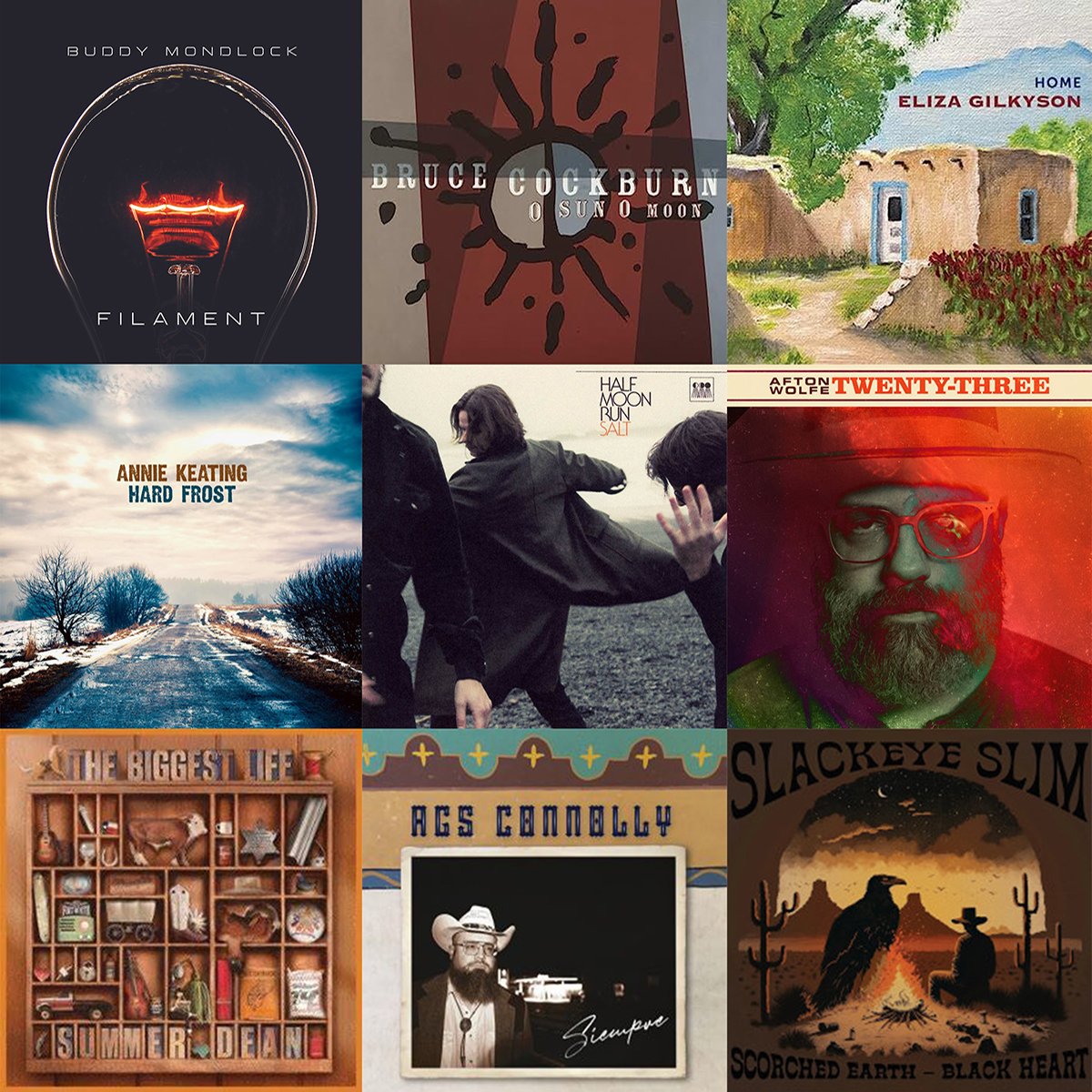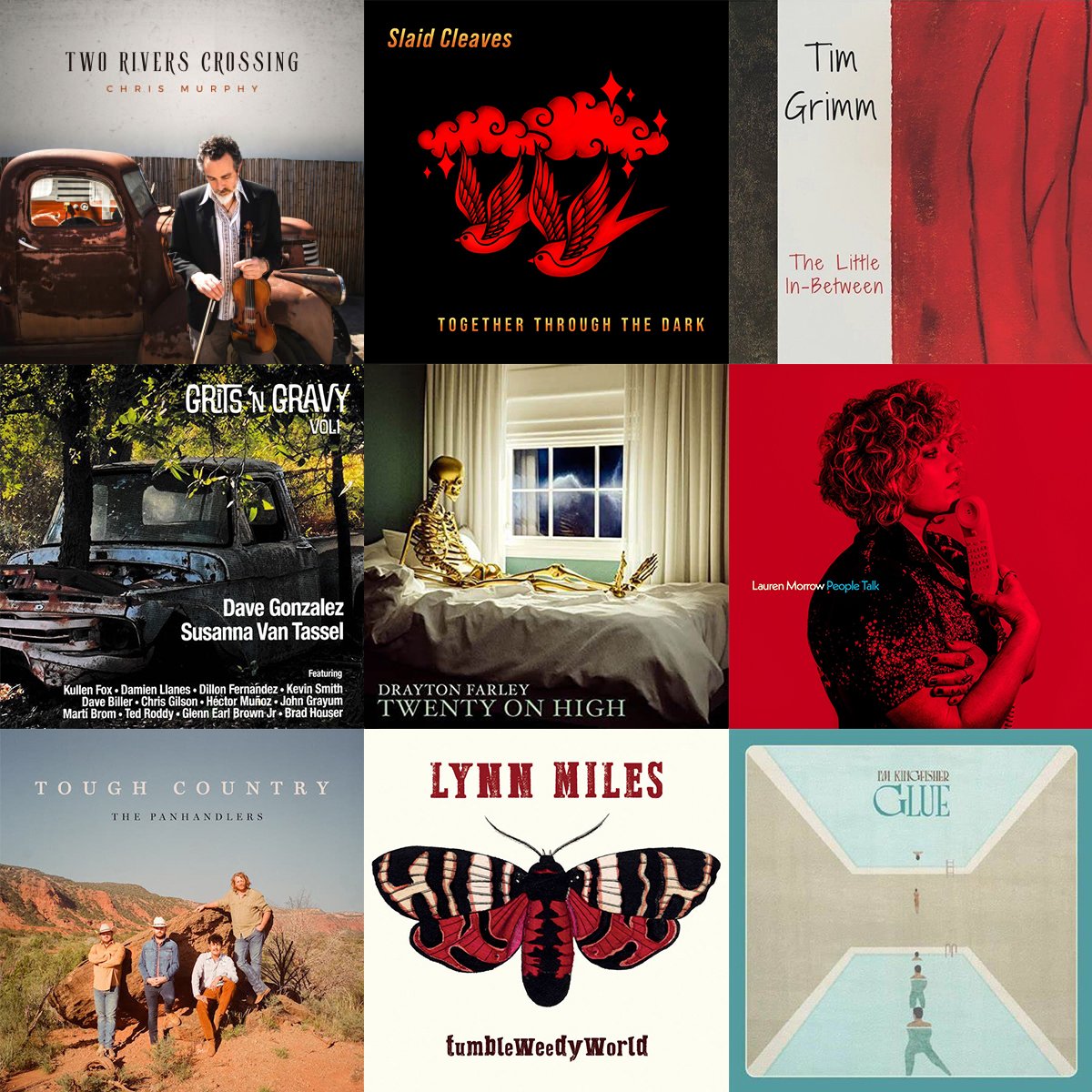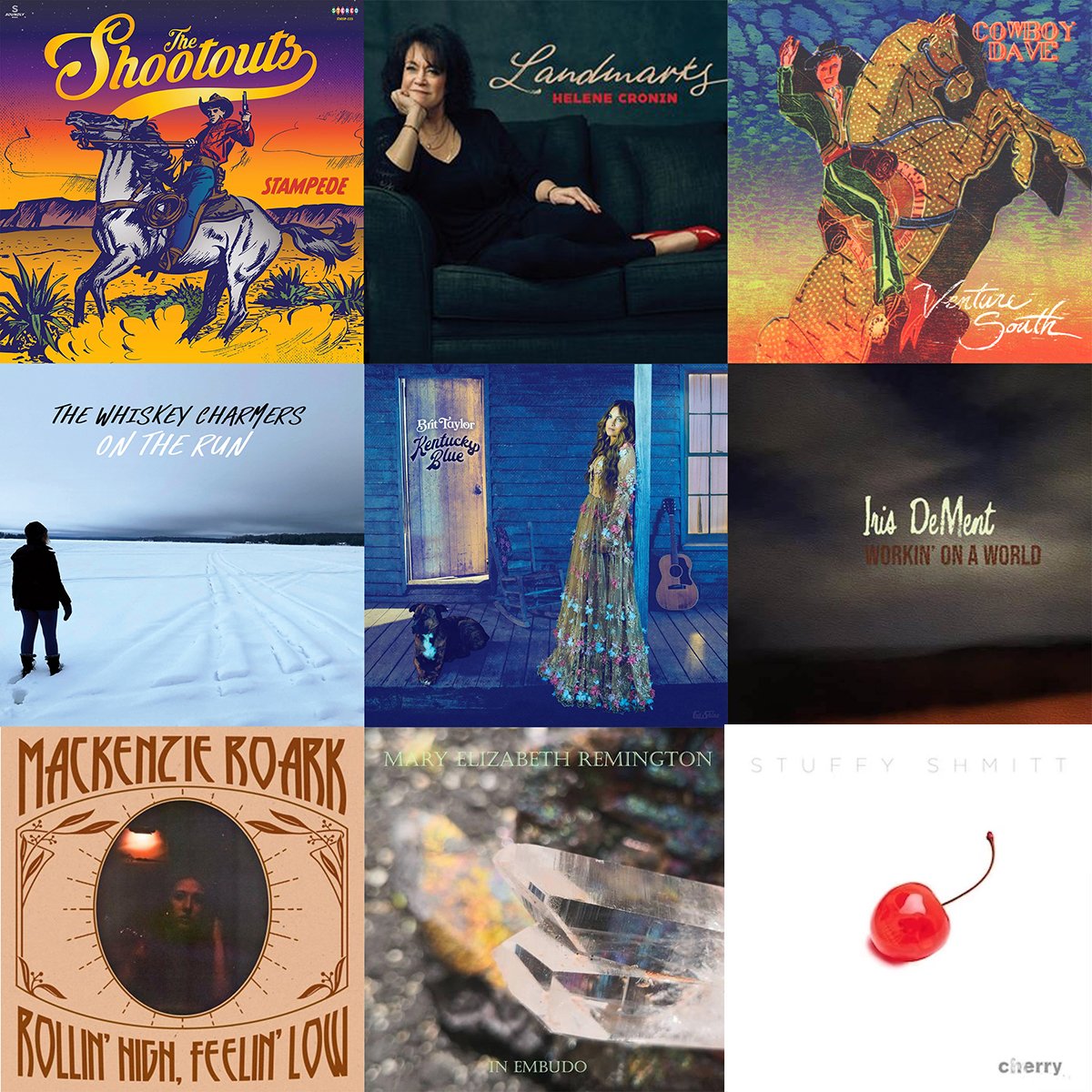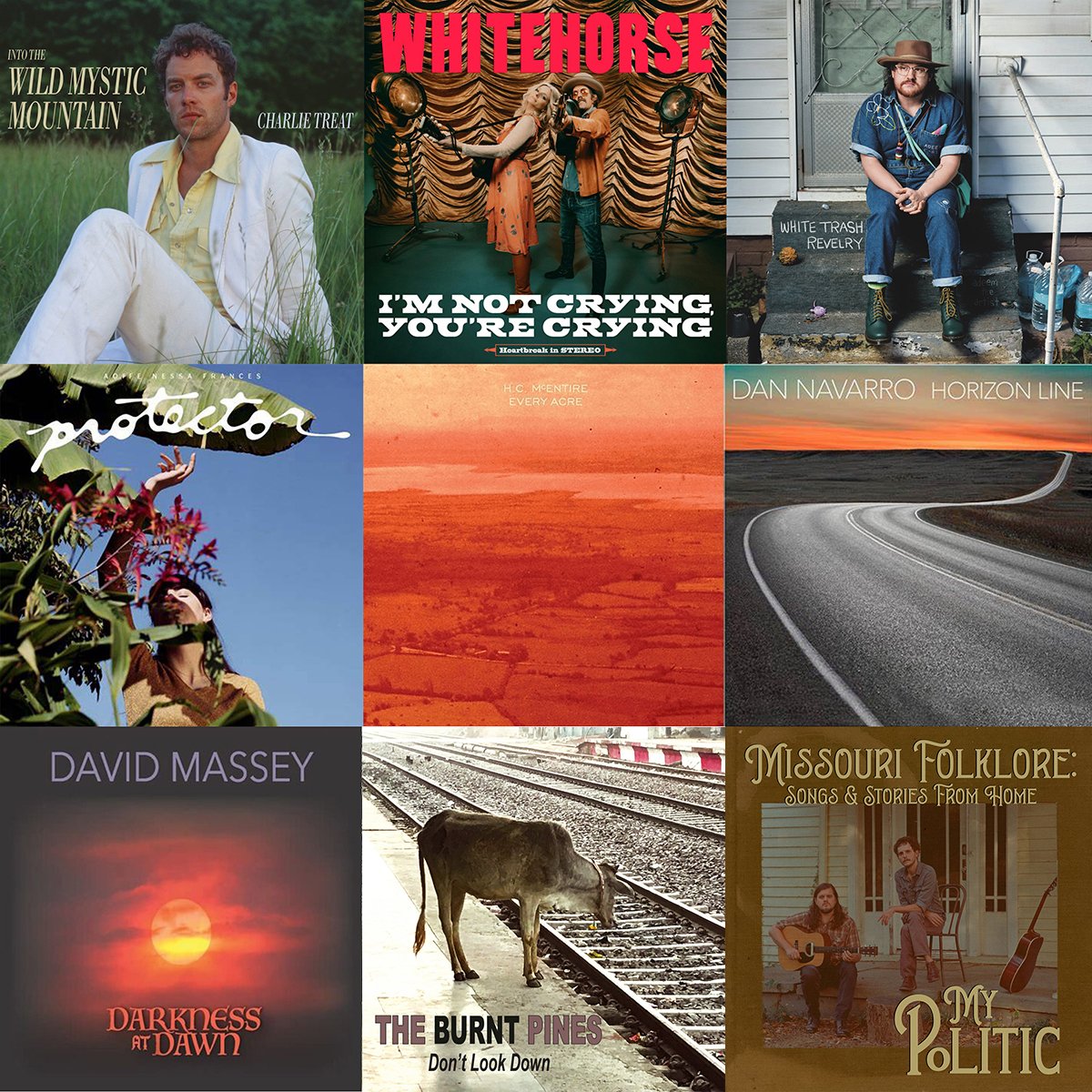Colter Wall Little Songs La Honda/RCA
Although still in his late twenties, this is the fourth studio album from Saskatchewan-born singer songwriter Colter Wall. With a deep baritone voice and real-life tales of rural life in his prairie homelands, Wall has established himself as one of if not the most distinguished authors writing about present-day cowboy and ranch lifestyle.
LITTLE SONGS finds Wall sticking close to the template of his previous three albums, and why leave his comfort zone given their quality and distinctiveness? The recording occurred at Yellowdog Studios in Wimberly, Texas, where he also recorded his 2020 album, WESTERN SWING & WALTZES and OTHER PUNCHY SONGS. Wall co-produced with Patrick Lyons, who also played pedal steel, mandolin, bass and dobro. The ten tracks on the album include eight original songs and two covers very much in keeping with the album’s narrative, one written by his fellow countryman Ian Tyson, The Coyote and The Cowboy and the other is a Hoyt Axton and Kenneth Higginbotham co-write, Evangelina.
Wall has seldom had to look beyond his native Western Canada for inspiration and his stories at no time attempt to glamorise its subject matter. The title track speaks of isolation and remoteness (‘You might not see a soul for days on them high and lonesome plains, you got to fill the big empty with little songs’) and that sense of loneliness also surfaces on Corralling The Blues. The perilous adventure of yesteryear’s cattle drives is evoked in The Last Loving Words (‘Two thousand longhorn cattle, some eighteen good men in the saddle. We knew of the dangers, me and that old ranger’). The closest Wall gets to breaking into full song is on the upbeat barroom blues of Honky Tonk Nighthawk and he parades his yodeling skills on the jocular Cow Calf Yodel. The opening track, Prairie Evening / Sage Brush Waltz, reminisces about plucking up the courage to woo his sweetheart at the local prairie dance.
A dynamic storyteller, Walls’s proficiency in giving the listener a tour of his beloved native soil is unparalleled among songwriters of his generation. His sober tales hark back to both previous eras and to the modern-day cowboy and rancher. Unsurprisingly, three of his songs have been featured in the Paramount TV series, Yellowstone, another project that highlights the growing interest and current attraction in the ranching and cowboy way of life.
LITTLE SONGS is another excellent effort from Wall and one that has ’career best’ stamped all over it, which is some feat given the merit of his previous work. Don’t take my word for it, check it out yourself, I’m sure you’ll concur.
Review by Declan Culliton
Milly Raccoon Frankincense and Myrrh Self Release
Drawn to classic violin playing as a young girl, Milly Raccoon’s musical adventure since then has been a rollercoaster ride. From Pittsburgh, Pennsylvania, and currently living in Nashville, her passions over the years have found her engrossed in 90s rock, Irish trad music and zydeco, fronting a Grateful Dead cover band in high school, absorbed in bluegrass after college and spending eighteen months on the road, busking for the bus fare to her next destination. With that chequered background, you’d expect this album to genre-swing from one place to another, and that’s exactly what it does, most impressively it has to be said.
It’s her fourth full-length album and although the press release that accompanied it makes comparisons to Norah Jones and Iris DeMent, neither of those references particularly struck me. What did come across on my first play was a charming patchwork collection that oscillates between traditional instrumentals, country-tinged jazz and alt-folk songs.
At the tender heart of the album is the opener The Fine Art of Takin’ it Slow. It’s a laid-back affair that finds Milly in fine voice and all the better for some cool layered vocals and a slick guitar break mid-song. Her Irish trad influences rise to the surface on Persephone la Rousse and the instrumental Fiddler’s Prayer. That Celtic mood also pops up on the gorgeous ballad and album highlight Offering To The Fae and she lays bare her bashfulness in the playful That Girl I Left Behind. The second instrumental, Las Abuelitas del Arcoíris, is a Latin-shaped cosmopolitan affair, showcasing Milly’s fiddle skills and her vocals shine on the romantic ballad This Ancient Love.
Grammy-winning producer and previously former bandmate of Kacy Musgraves, Misa Arriaga, was brought on board as producer and he succeeds in joining all the dots and capturing the mood on the, often, fun-filled and carefree tracks.
Beauty is often born out of chaos and that’s certainly the case with this charming record. Unlike anything else I’ve heard this year, FRANKINCENSE AND MYRRH is not going to appear on the Billboard Hot 100 Charts, but if you’re around Nashville and Milly is playing Dee’s Cocktail Lounge or any other local establishment, you’re well advised to pop along. I’ll certainly be doing that on my next trip to Nashville.
Review by Declan Culliton
Erin Enderlin Barroom Mirrors Black Crow
Hugely admired by her peers - Roseanne Cash and Terri Clark both feature on this album - Arkansas-born Erin Enderlin ticks all the boxes as a classic modern country artist. A singer, songwriter, and performer, she also possesses an image that should warrant much more media attention and radio play than she currently enjoys. Her songs have been recorded by Alan Jackson, Randy Travis, Lee Ann Womack and Reba McEntire and, given her talent, you would expect that her profile would be at a much more elevated level.
BARROOM MIRRORS is her latest self-produced record and it doesn’t stray too far from the sound of her first-rate 2017 album, FAULKNER COUNTY. Readers familiar with her music will have already heard five of these tracks on her self-released EP of the same name from 2021.The majority of the eleven songs on the new album take their lead from the album’s title with their drinking and bar references, no doubt fuelled by Enderlin’s observations in bars and honky tonks on her tireless touring schedules.
Terri Clark joins her on the perky If There Weren’t So Many Dawn Songs, co-written by Enderlin and Kayla Ray. As previously mentioned, there are plenty of ‘tears in your beer’ songs, or something stronger in the case of When I’M Drinking Whiskey. A tale of heartache enriched by fine pedal steel from Justin Schipper, it’s one that’s bound to be picked up and covered by others. It also features, along with other tracks, a contribution from the ‘go-to’ backing vocalist in Nashville, Melonie Cannon. Enderlin is also ‘counting bubbles in her beer’ on the equally sorrowful title track. It’s not all doom and gloom either, Somebody’s Shot Of Whiskey is a defiant upbeat toe-tapper featuring some fine fiddle playing by Jenee Fleenor and White Wine Fever (yes, another booze reference!) is a clever and chirpy album opener. She signs off with the confessional and autobiographical Livin’ For Today. It’s a candid and realistic reflection on the often-taxing existence of her chosen career path (‘It will be all right to be just ok, not worry about tomorrow, I’m livin’ for today’).
The tide is turning slowly again in the direction of traditional country music. Hopefully, artists like Erin Enderlin, Brennen Leigh, and Sunny Sweeney, all of whom have been working tirelessly for many years, will get the industry recognition that they richly deserve. On the strength of this delightfully accessible listen, it’s the least that Enderlin deserves.
Review by Declan Culliton
Dallas Burrow Blood Brothers Soundly
Very much an artist that writes from the heart and personal experience, Texan Dallas Burrow’s two previous albums, SOUTHERN WIND from 2019, and his self-titled record that followed two years later, reflected moments in time in his often turbulent and evolving existence. If the former addressed the emergence from a self-inflicted emotional wilderness and his path toward sobriety, the latter found Burrow in an altogether better place, underpinned by abstinence and fatherhood.
Music has been in Burrow’s veins from a young age. His father, Mike Burrow, hosted shows at a pub he managed in Elliston Place, close to the Exit /In in midtown Nashville, whose patrons included Richard Dobson and Townes Van Zandt. The adulation of Townes has been handed down from father to son and has been hugely inspirational in Burrow’s songwriting. His latest album includes a cover of Townes’ Mr. Mud and Mr. Gold and also features a song written by his father, X Old Flames, the layered vocals on the song performed by both father and son.
While not straying too far from the direction of the two previous albums, the thirteen songs on BLOOD BROTHERS have a more polished sound production-wise, no doubt aided by the input of Jonathan Tyler (Nikki Lane, Jeremy Pinnell, Lana Del Ray), who took control, alongside Burrow, of the production duties. Personal plights are once again visited in the songs but the canvas is also spread wider with environmental, political and social issues confronted. He opens with the upbeat River Town. It’s a statement by the writer of his contentment with family life and is followed by the equally spirited Starry Eyes, which is probably the most melodic, radio-friendly song Burrow has written. It’s also one that’s likely to stick in your memory bank for some time after a couple of spins, it most certainly did with me. It features Taylor Rae on backing vocals, who also lends a hand on several other tracks including the raging full-on album closer, True Believer. The recurring theme of solo touring, often fulfilling, sometimes not, is told on Motel 6. Also impressive is Only Game In Town, a co-write with Charley Crockett that was included on Crockett’s MUSIC CITY USA album. That song may be closer in sound to New Orleans than Austin, but the gloriously rowdy Wild Bill is full-on Texas country.
A dynamic storyteller, Burrow has turned the heat up many notches with BLOOD BROTHERS, which should further his growing reputation as a worthy disciple of the classic Texan songwriters of previous generations.
Review by Declan Culliton
Melonie Cannon A Tribute To Vern Gosdin BFD
Nashville-based singer Melonie Cannon is a member of a family steeped in country music. Her songwriter and producer father, Buddy Cannon, has written songs for George Strait and Mel Tillis, as well as producing albums by George Jones, Merle Haggard, Willie Nelson and Reba McEntire. Also following a career in music is her sister, singer songwriter, Marla Cannon-Goodman.
Although Melonie has only recorded two solo albums, MELONIE CANNON (2004) and AND THE WHEELS TURN (2008), her crystalline vocals appear on albums recorded by Jamey Johnson, Willie Nelson, Billy Ray Cyrus and Alison Krauss, to name but a few. She was an inspired choice to celebrate the music of the celebrated country singer Vern Gosdin, who passed away in 2009, leaving an extensive songbook of classic country songs.
An early-career member of The Hillmen, alongside Chris Hillman, Gosdin also went on to record, with his brother Rex, the excellent GENE CLARK WITH THE GOSDIN BROTHERS in 1967. His commercial impact as a solo country artist yielded nineteen top ten hits between 1977 and 1990 and the high regard that he was held in by his peers - they nicknamed him ‘The Voice - is recognised by the number of high-profile contributors on this recording. It’s fitting that Melonie Cannon should be chosen to acknowledge the often-overlooked talent of Gosdin, given that he can take credit for mentoring and encouraging her to sing solo and harmonies, and develop her musical vocation.
A pointer to the character of Gosdin’s songwriting is how well-suited the songs are delivered from a female perspective, and even more so on the duets unveiled on this recording. Jim Lauderdale and Cannon do a cracking ‘George and Tammy’ on the full-on honky tonk Dim Lights Thick Smoke (And Loud, Loud Music) and Cody Jinks’ husky vocals are the perfect fit alongside Cannon’s on Set Em’ Up Joe. Vince Gill, Jamey Johnson, Doyle Lawson, Alison Krauss and Willie Nelson also participate, with Nelson in splendid voice on Till The End. Cannon is equally impressive and in fine voice on her solo runs, both tearjerkers, Is It Rainin’ At Your House and Dream Of Me are impeccably executed, and she says her goodbyes with the well-chosen jazzy closing track, Is It That Time Again. The album showcases impeccable instrumentation by a host of players from start to finish. Those artists include Willie Nelson and Vince Gill, who played acoustic guitar and dobro respectively as well as their vocal contributions. Also credited are the late Bucky Baxter on steel guitar, co-producers Buddy Cannon (bass, acoustic guitar) and Butch Carr (percussion).
Be warned, Gosdin didn’t write ‘happy ending’ songs and the thirteen selected are route-one country heartbreakers. So, if you’re feeling low, it may be wise to have the hankies close by. In summary, the album is a worthy reminder of Vern Gosdin’s significant contribution as a songwriter and one that should encourage listeners to investigate his back catalogue. It’s also heartwarming to hear Melonie Cannon in such great voice, and hopefully it’s also the re-birth of her career as a solo recording artist.
Review by Declan Culliton
Dave Desmelik There And Then (July 1992-December 1994) Self-Release
Two and a half decades into his career and eighteen albums later, THERE AND THEN (JULY 1992-DECEMBER 1994) is most likely the most soul-searching and subjective album that the Brevard, North Carolina resident Dave Desmelik has recorded. It may consist of only five tracks and run for slightly over thirty minutes, but the tales within the songs reflect on an intense, taxing, and ultimately character-building period for the writer as he sets out on what was to become his vocation.
Desmelik’s writing and vocals bring to mind Bright Eyes, Jim White and former Richmond Fontaine’s frontman, Willy Vlautin. He rarely wastes words with repeated choruses, and if asked to simply characterise this album I’d probably make reference to those three artists, but also quote the experimental and alternative sound of Radiohead and early Pink Floyd in snatches.
The album covers the entire range of emotions and sensitivities of a young person seeking independence and freedom, and the experiences, both demeaning and uplifting, on that journey. The opener, Me And Bob Marley, sets the scene for what follows over the subsequent chapters which are arranged in chronological order. That first track tells of the writer’s dreams of a new life and new horizons (‘I thought I might try growing a beard, that would be something a little bit different for me’), moving out of town accompanied by little but his treasured music collection of Bob Marley, Grateful Dead, Duane Allman, Pink Floyd (no surprise there) and many more. It’s presented in a folky manner with Desmelik’s vocals in front of a heavily strummed acoustic guitar. Rand McNally, which follows, is the most mainstream song in the collection. Its melody is a reflection of the enthusiasm of a planned journey being choreographed using Rand McNally maps – remember this is some years before the birth of Google Maps! – and includes some slick banjo playing by Bow Thayer.
If those two tracks are somewhat musically conventional, what follows enters a more enthralling universe, possibly reflecting the odyssey into the unknown. Risking blends together elements of alt-folk and musical virtuosity bordering on prog rock. That track may be eight minutes in length, but the album’s tour da force, Crazy Life, qualifies as the longest track at close to ten minutes. Brim-full of texture and detail, it serves as a ‘catch up’ for the listener by recapping the author’s mournful story, warts and all (‘I discovered this town with my guitar on my back, I slept in the cemetery behind campus where I felt safest when it got dark’). The final instalment, New Chapter, is an altogether more positive affair that heralds the final leg, however temporarily, in the journey.
Attentive listening is the key to maximum return with THERE AND THEN. Preferably listened to with headphones, the time invested is well rewarded on an album where its author dug deeply into his memory vaults to capture the mood of those often daunting and occasionally carefree two years with some aplomb.
Review by Declan Culliton
Teddy Thompson My Love Of Country Chalky
Back in 2007 Teddy Thompson released an album of country music covers on the Verve label titled UPFRONT & DOWN LOW. It was one of my albums of the year and it still sounds great. When I interviewed him around its release he told me his label had said that it was effectively “career suicide” and they wouldn’t release its like again. Well, Thompson is no longer on Verve and he has just released another album of country music covers. And folks, I can tell you it’s well up to that previous album and it is another triumph.
One of the players back then was David Mansfield who played on three tracks. This time out Mansfield is the producer and he brings a touch that could have easily seen him behind the desk several decades ago. As the title suggests, Thompson has a deep love of classic era 60s country stylings and Mansfield taps into that, not only behind the desk but also by bringing his multi-instrumentalist talents along. He is joined by a tight combo of Charlie Drayton on drums, bassist Byron Isaacs and Jon Cowherd on piano. Thompson stands before the microphone and delivers a nuanced and emotionally passionate vocal performance. But he is not alone, with such notables as Vince Gill, Rodney Crowell, Aoife O’Donnell, Krystle Warren and Logan Ledger joining him on harmonies, alongside some additional background singers, that makes this a vocal rich album.
The song choices are a mix of the familiar and the less so, but all chosen as they have a distinct resonance for Thompson and are equally well suited to what seems like an effortless vocal. But that is likely far from the actuality, as he undoubtedly wanted to do justice both to the original singers but also to the lyrics and their sense of regret and unresolved romance. Even though the songs are from what may be considered a golden age of country, the arrangement and delivery of each song changes to give both variety and vibrancy to each of these carefully chosen pieces.
So A Picture Of Me Without You, written by Norro Wilson and George Richey and recorded by George Jones, opens the album and sets the tone for what follows. Bill Anderson is then credited with the conundrum that is I Don’t Love You Anymore, Hank Cochran and Harlan Howard together wrote the tower of pity that is I Fall To Pieces. Love And Learn is a lesser know Dolly Parton song written by Bill Owens, while Crying Time was penned by Buck Owens. The often recorded tale of realising what is really true and worthwhile in life, Joe ‘Red’ Hayes and Jack Rhodes’ Satisfied Mind, it is given as convincing a take as any of the previously equally worthy versions. Is It Still Over has some clever wordplay on a song recorded by Randy Travis. I’ll Regret It All In The Morning may be from a slightly different era than many of the others, as it was written by his father, Richard Thompson. And so it goes, with ten deliberately chosen songs that, in the context of this excellent album, did not entice me to make direct comparisons to earlier versions, but instead allowed me to simply enjoy the album inspired by Thompson’s passion for the sentiments and sensuality of a musical style so obviously loved. Even though this is something of a stop gap recording before he moves on to another album of original material, it in no way should be regarded as anything but a central part of his own rich musical legacy.
Review by Stephen Rapid
Christian Parker Sweethearts Edgewater
First thoughts: with the release of the Legacy edition of the original album that restored Gram Parsons’ vocal on a set of bonus tracks, and taking in to account the fact that is is considered such a iconic and inspirational album, it begs the question do we need a tribute album to the entire album? However, once you start to listen you can’t help but be reminded of the original album, an album that was largely a source of confusion for many hard-core Byrds fans at the time, despite the fact that previous albums had contained tracks that were clear antecedents for the style. It was largely Chris Hillman and Gram Parsons who championed this move toward a more full-blown country influenced recording. Indeed, that duo later formed The Flying Burritos Brothers to further explore that direction. Not that the continuing Roger McGuinn version of The Byrds abandoned the form themselves, especially when Clarence White joined the band.
So this tribute is fronted by Christian Parker, alongside co-producer (and pianist of the original album) Earl Poole Ball. Also appearing on a couple of tracks is one the album’s steel guitar players, Jay Dee Maness. The other steel player on that album was Lloyd Green. Incidentally, they both released their own tribute album back in 2018, titled JOURNEY TO THE BEGINING. That recording also featured the piano of Earl Poole Ball. All showing that these veterans and their fellow musicians here are no strangers to the album. There are in fact 16 players listed in the credits, with no less than 3 pedal steel players included. Parker is lead vocalist and plays acoustic and B Bender electric guitar.
Parker was born in 1968, the year of the album’s release, and first heard the album when he was 16 and it obviously made a deep impact. And as you play through the album you become aware of the differences that this album brings to the choice of songs. They largely follow the order of the earlier version. They have interestingly also added three additional, equally well know songs in I Still Miss Someone, Satisfied Mind and Drugstore Truck Driving Man. These are delivered as if they were recorded back in the late 60s, as in truth, are all the tracks.
Parker is not an artist I recall coming across previously, though he has had a long career and has released some 6 previous albums under his own name. Coming from upstate New York, he was a member of Waydown Wailers. This is perhaps his first full on country rock album, something he has an affinity for and a path he may logically explore in the future.
As regards standout tracks, you are immediately feeling the overall vibe from You Ain’t Going Nowhere, from Tracer James’ affecting pedal steel that summons Lloyd Green’s own on the original, alongside Poole’s ebullient piano work. Maness is also repeating his performance here on The Christian Life. Parker is particularly poignant in his vocal performance on You Don’t Miss Your Water. Perhaps the finest song from the original album is Parson’s ballad Hickory Wind, here Jennifer Kessler’s violin and harmony vocal are a perfect balance to Parker’s, very much in the mould of eternal duo of Gram and Emmylou and again James’ steel is paramount. The inclusion of Satisfied Mind is effective, bringing it into line with the tracks that were part of the initial album, though the song was written by Joe ‘Red’ Hayes and Jack Rhodes rather than Porter Wagoner as listed in the sleeve note. Similarly his version of Drugstore Truck Driving Man was taken from a later Byrds album, but becomes a fitting closing track here.
I may have had certain doubts, as noted above, which may be valid to many devotees of the original recordings but, either as a reminder of The Byrds version or as a piece of country-rock in its own right, this outing this is worth more than a passing listen and hopefully Parker will be in a position to play this album live too. I know also that both McGuinn and Hillman have been playing some of these songs accompanied by Marty Stuart and The Fabulous Superlatives to positive reviews. That both entities are bringing a seminal album before a younger audience, who may not have heard them before, is positive and rewarding and may open a door to some more cosmic country stylings, as there are already a number of bands now delving into that particular Pandora’s box of 12 string guitar and pedal steel delights.
Review by Stephen Rapid
L CON The Isolator Idée Fixe
Progressive Folk is a genre defined as a style of contemporary Folk that adds new layers of musical and lyrical complexity, often incorporating various ethnic influences. A very appropriate description when it comes to the music of L CON, or Lisa Conway. She defines herself as a songwriter, producer and sonic adventurer and the experimental nature of these ten tracks certainly moves close to that description. There are layers of synthesiser and looped sounds among the instruments that include a variety of percussive sounds, piano, woodwinds and alphorns, traditional wooden horns from her native Switzerland, together with strings mixed into the lush soundscapes.
Conway has a sweetly soothing voice that has an ethereal quality and is placed high in the self-production of the project that took shape in an Ontario recording studio and at her home. The lyrics are very obtuse but there is a sense of isolation, as the title of the album suggests. It was written during the Covid lockdown so that alone gives a strong sense of the influences that were at play. There is a theme of looking for connection also that runs through the songs, searching for meaning in a time when no real direction or certainty can be given.
Song titles such as Big Pile Of Nothing, Appear, Hold and Ordinary Girl don’t really convey the different musical sounds on the album. The title track is the lushest as regards an arrangement with swirling strings filling the space. Too Much on the other hand has dissonant sounds mixing with violin and ‘found sounds’ that give a feeling of alienation. What If Heidi Likes the City is a song that reflects on the isolation of rural life after leaving a city culture.
My information includes no musician credits apart from the fact that contributions were made by, among others, Drew Jurecka, Cedric Noel, Karen Ng, Victoria Cheong, Isla Crain, and Morgan Doctor. Alphorn, Tape Loop One opens the album and Alphorn Tape Loop Two closes it with instrumental soundscapes that are both haunting and somewhat sonorous in the delivery. It is a challenging album, with some lovely pastoral qualities but also some jumps into the realm of avant garde experimentation. Folk music by another name perhaps?
Review by Paul McGee

